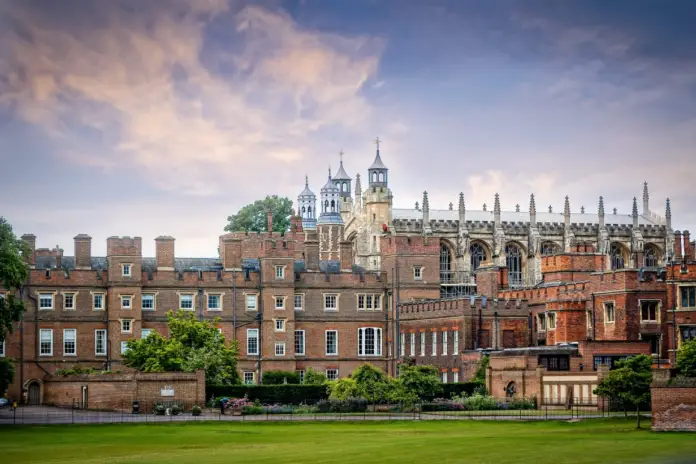There are only 500 private boarding schools in Great Britain. They are really elite and quite expensive institutions. Some names are on everyone’s lips – Eton, Harrow, Rugby, Marlborough – and some say nothing to the uninitiated.
A typical boarding school is a kind of small town. As a rule, any school has excellent conditions for classes, academic and not only, and quite modestly organized life. Students tend to live in dormitories of three or four people. Discipline, active sports, and a busy daily routine.
Despite the external similarity, each such campus has its own specifics. One school has stables, another – the zoo, and a third, let’s say, stands by the river, and all engaged in rowing. Some schools are in the middle of a small town, some are in the fields, isolated from the rest of the world. There are schools located on the coast, blown by the sea wind. Often these have a military heritage: imagine a platz facing the sea, where children march in the rain in fine British weather.
What is the age a child can be sent to boarding school
Boarding school starts at age eight, but students from abroad usually enroll at age 13. This means that you have to start preparing a year or two in advance. Some schools have an entrance test at the age of 10 – these are usually the ones where there is a particularly strong emphasis on academic achievement: success in the general subjects, as well as broad mastery of different fields (eg art, photography, excellence in sports and music, passion for literature, community service, helping animals).
In such schools, children are expected to be appropriately motivated: to find their own path and exciting direction so that in high school they can concentrate on their chosen subjects. It is not uncommon for children to enter boarding schools and at the age of 16 for the last two years of high school, where they study the A-Level program and study three or four major subjects in-depth, which are necessary for entry into university.
How to enroll in a British boarding school
Entrance examinations consist of academic examinations in mathematics and English; depending on the school’s profile, tests in science, logic, music, intellectual potential, or other subject areas may also be included.
Exams are taken on the same day with a lunch break, each stage lasting from 45 minutes to one hour. The tests take the form of a variety of written or computer-based tests. Each examination sheet can contain from one task to write an essay or analyze a passage of text to dozens of questions: from simple ones from the general school program to the so-called asterisk questions.
The latter will require a high level of acumen, critical thinking skills, logic, spatial thinking, and, of course, general literacy. Ignorance of the general principles of taking exams and insufficient knowledge of English are the most common reasons for lower scores.
In the English exam, a student will be asked to take a grammar and vocabulary test, or analyze a text, or write an essay. Sometimes all together. For example, you may be asked to write your own continuation of a well-known story from The Wizard of Oz or compose your own version of the development of events in Harry Potter.
In addition to the academic exams, an interview with the child is no less important part of the admission process. During these interviews, school representatives try to get an impression of the child’s personal qualities, ambitions, and aptitudes.
It is also important what impression the parents made when they visited the school. There are cases when they are the ones who do not pass the test. For example, if the parents, who shower the child with hyper-peddling, from the very threshold tell the school how the child’s life should be arranged – the chances for admission will be equal to zero, the British do not allow parents in the internal organizational processes of the school. Nor will parents assume that everything can be solved with money.
How education in a British boarding school works
The school year is from the first days of September to the first days of July. The school year is divided into trimesters: fall, winter-spring, and summer. There are approximately 36 weeks of study, and the rest are six vacations per year.
A peculiarity of the British educational system is the so-called “pyramid principle”. The older a pupil is, the fewer subjects they have to study, and consequently, the deeper they can immerse themselves in the subjects they have chosen to study.
At age 13, a student may have up to 13 required subjects, including, for example, math, English, literature, geography, chemistry, biology, physics, art, drama, as well as business, two foreign languages, religion, and philosophy. And in high school, there are no more than five, or even three subjects: only those that the child has chosen for further in-depth study and that they needs for university admission.
How much does it cost to go to a British boarding school
Boarding schools are not-for-profit institutions run by boards of trustees. All profits go to the school, so tuition prices are about the same everywhere, with a discount for slight differences due to geography, etc.
Sending a child to high school after the age of 13 will cost parents 50 thousand pounds a year. Right now that’s about $70,000 USD. What is included in this amount? Tuition itself is about 36 thousand pounds a year. In the boarding house, the children live on an all-inclusive system: the amount includes tuition, accommodation, meals, sports, and hobby classes.
All the extra costs will come to about £3,000 a year: the purchase of some little things – souvenirs, trips, cabs, etc. We also need to take into account the cost of six vacations a year – that’s 12 flights. Health insurance will cost £300 a year. The visa is £800.
What are the advantages of British boarding schools
What does a British boarding school offer besides a fairly serious academic education and a good chance of getting into a big-name university? Boarding schools are first and foremost a school of life, not only and not so much a way to get an academic education.
Raising an independent personality
Boarding schools actively shape the personalities of their students, a process that is not always comfortable. Boarding school creates difficulties for independent coping literally at every step and encourages children to make their own decisions: what subjects to choose, what pace of self-study to apply, how and with whom to interact, how to adapt and get along with the very different people with whom the child is brought to boarding school.
The inoculation of independence is guaranteed. More often than not, future leaders come out of the walls of private schools, people who are able to build their lives independently and take responsibility for it, who can look at the world openly and accept it, because they acquired these skills in childhood.
Team spirit
An important feature of a British school is the team spirit that develops in common projects, participation in inter-school competitions, and simply in the course of study because each department or house is a kind of community, a collective.
Reliance on tradition
This is one of the pronounced features of British boarding schools. Traditions related to clothing, traditions of meetings, dinner parties, centuries-old rituals such as religious ones.
Interestingly, the veneration of centuries-old traditions, such as compulsory attendance at Sunday masses, coexists perfectly with the boarding schools’ state-of-the-art equipment for learning: computers, recording studios, laboratories, etc.
Altruism
As strange as it may sound, students at expensive private schools do learn to think beyond themselves: all schools participate in social projects to raise money for the needy, to benefit the environment, and for scholarships for children who cannot afford to pay their tuition.
Adaptability and openness
Going to boarding school, the child finds themselves in a new environment to which they have to adapt, literally every minute. But even if you are not British, in a British school the child will be treated with respect, their unusualness or “non-Englishness” will not be a reason for bullying. As a result, the child develops skills such as openness, the ability to communicate and negotiate, to show initiative and find a compromise, self-confidence.
What are the disadvantages of boarding schools
Stressful for both children and parents
First of all, being in an unfamiliar environment is always stressful for both children and parents. Parents have the hardest time here: they cannot see what is happening and cannot help their children. Imaginary fears are always greater than real ones.
Plus, schools are negative to attempts at total control by parents and are not inclined to make concessions. Total control of the school is ruled out: there are no parent chats, no regular parent meetings. Three times a year, a characteristic with a detailed report on the child’s progress and progress in the subjects will be sent by email.
The child may not adapt to the new environment
There are cases when they have to be taken away. It is necessary to understand that this form of education is not universal: for example, it won’t suit a child who for some reason is completely unable to interact with society. For them, an encounter with the new world can be a tremendous trauma.
Problems with discipline and diligence
In a situation where there is no petty control over academic performance – no one in boarding school will make you do your homework, and parents are far away – some children run the risk of becoming procrastinators. They study the subjects they are interested in and catch up on the rest before exams.
What myths exist about boarding schools
There are many myths surrounding boarding schools, and one of them is true: You cannot get into a boarding school for money. Indeed, money won’t help if the admissions committee feels that the child or their family is not a good fit for them. Money is better invested in preparation.
Sometimes it is also said that private schools do not like non-English children. In fact, in today’s British schools up to 30% of foreigners, and no one thinks to treat them differently. Rather, on the contrary, manifestations of racism or intolerance are something for which it is very easy to get kicked out of any English school.
In boarding school, a student gets experience in a very multicultural environment, gets the skill of an open attitude to everything unfamiliar, even an inoculation against xenophobia.
Another mythologized fear is that the child will be separated from their family. In a physical sense, this is true. But first of all, there are vacations. Second, the quality of communication in the family tends to increase, on the contrary, when the element of everyday, routine, domestic discussions disappears from the relationship. It often happens that children feel unwanted, neglected, day after day living in the same apartment with their parents.
And thirdly, if we look at things realistically, a family that has the opportunity to send a child to boarding school is usually people who are involved in business and do not have the time and energy to fully engage in day-to-day parenting. In such a business-oriented rhythm of life, boarding is a good way out.
And its parents see it not as an opportunity to get rid of a child, but as a chance in today’s busy family to give their child a chance to grow up in an interesting environment and have a unique experience.
And fears about brutal conditions, cold and hunger, are outdated in the days of Dickens. Believe me, no one will pamper the students, but they are also not threatened with deprivation. This is not a penitentiary: children are always interacted with, respecting their personality.






